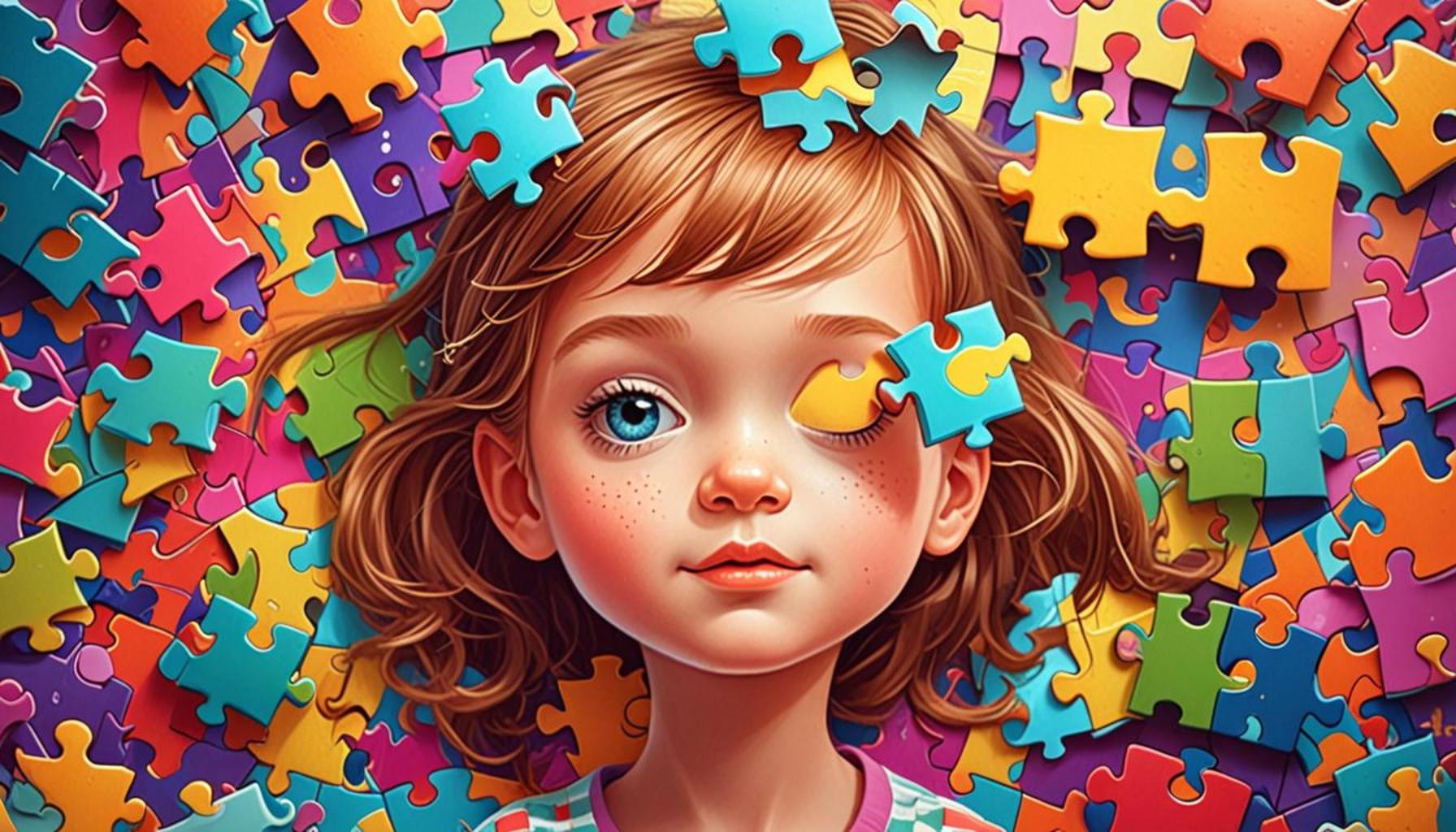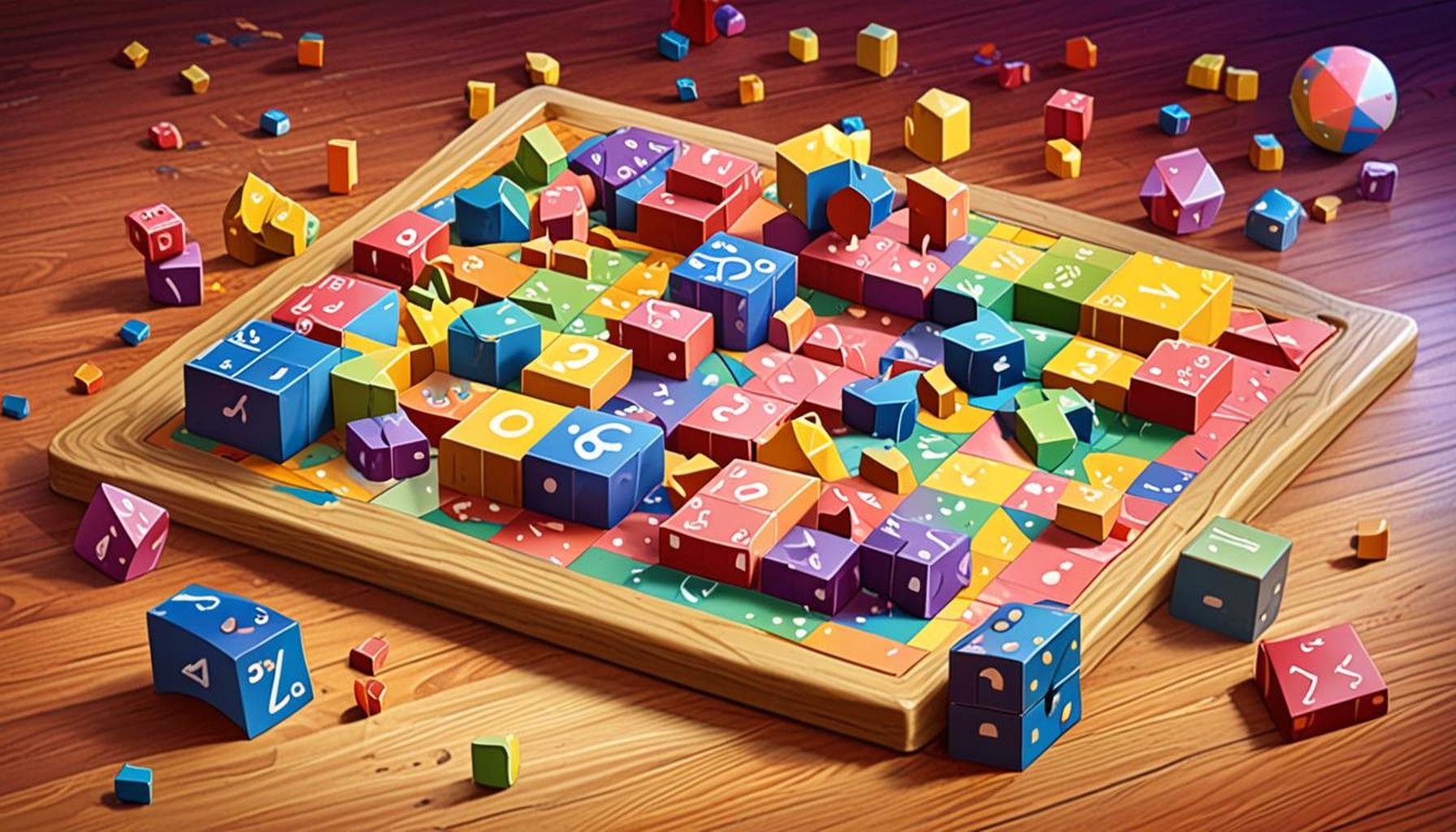Exploring the Connection Between Puzzle Complexity and Cognitive Growth in Early Childhood

The Benefits of Puzzles in Cognitive Development
From colorful jigsaw pieces to intricate brainteasers, puzzles are more than just a pastime for young children. They serve as essential tools for cognitive growth during early developmental stages. Understanding the relationship between puzzle complexity and a child’s mental acuity can provide valuable insights for parents and educators alike.
Research suggests that engaging with puzzles can significantly impact various cognitive skills in children, such as:
- Problem-solving abilities – As children work through challenges presented by puzzles, they learn to identify problems, strategize solutions, and implement them effectively. For instance, encountering a tricky 12-piece jigsaw puzzle prompts a child to think critically about the pieces’ shapes and colors, fostering a hands-on experience in solving problems.
- Spatial awareness – As children manipulate puzzle pieces, they enhance their understanding of shapes, sizes, and spatial relationships. This skill is foundational for later subjects like mathematics and engineering. For example, a child putting together a 3D puzzle must visualize how pieces fit together in three-dimensional space, which helps in developing essential geometric skills.
- Memory retention – Working through puzzles encourages better memory capabilities as children must recall shapes, colors, and patterns to successfully complete a puzzle. Simple repetition, like doing a puzzle multiple times, reinforces and builds memory pathways, making it easier for children to remember similar shapes and configurations in the future.
Consider the different types of puzzles available in today’s market. For instance:
- Simple wooden puzzles for toddlers focusing on shape recognition. These puzzles often have peg handles, making them easier for small hands to manipulate, while also teaching children to identify various shapes and colors.
- Multi-piece jigsaw puzzles for preschoolers that promote critical thinking. A 24-piece jigsaw featuring animals or landscapes can spark discussions about nature and enhance verbal skills as children narrate their assembly process.
- 3D puzzles for older children that challenge spatial reasoning. These complex puzzles, which might include structures like famous landmarks, require advanced strategies and can lead to an enriched understanding of architectural concepts and design.
As children encounter varying levels of puzzle complexity, they develop resilience and practice perseverance in the face of challenges. Whether it’s attempting a tricky puzzle or creating a new solution, each experience contributes to their cognitive toolkit. Moreover, puzzles encourage cooperative play when children work together, fostering social skills alongside cognitive development.
This article delves deeper into the connection between puzzle complexity and cognitive growth in early childhood, revealing why these activities are crucial for our youngest learners. By exploring how solving puzzles can enhance problem-solving skills, spatial reasoning, and memory retention, we illuminate the profound impact these engaging activities have on the minds of children. For parents and educators looking to boost cognitive development, integrating puzzles into playtime could prove to be a pivotal choice.
The Role of Puzzle Complexity in Cognitive Development
Puzzles serve as a multifaceted tool for cognitive growth, and understanding the complexity of these challenges can shed light on their effects on children’s development. Each type of puzzle, from simple wooden shapes to intricate multi-dimensional designs, presents unique learning opportunities tailored to various age groups and skill levels. The degree of challenge found in puzzles not only captivates a child’s attention but also significantly contributes to a range of cognitive skills that are vital for their growth.
One of the pivotal aspects of puzzle complexity is that it is directly proportional to the cognitive processes engaged during play. Higher complexity puzzles, for instance, are often constructed with larger pieces or multifaceted designs that require children to employ advanced problem-solving and critical thinking skills. This complexity demands that children not only utilize their existing knowledge but also draw upon creative thinking to navigate through difficulties.
Research indicates that as children engage with puzzles of varying complexity, they begin to develop essential cognitive abilities, which can include:
- Critical thinking – Higher complexity puzzles encourage children to assess situations more deeply and consider multiple solutions. This critical thinking ability is crucial not only in puzzle-solving but also in everyday decision-making.
- Fine motor skills – Engaging with more intricate puzzles requires dexterous hand movements, enhancing grip, coordination, and precision. These skills are foundational for subsequent learning in tasks such as writing and drawing.
- Collaboration skills – When children tackle complex puzzles as a group, they learn to communicate, share ideas, and resolve conflicts. This collaborative aspect fosters important social skills that extend beyond the puzzle itself.
The impact of puzzle complexity can be seen across various age groups. For example, toddlers benefit from simple, brightly colored puzzles that introduce basic shapes and colors, laying the groundwork for future learning. As children progress to preschool age, multi-piece jigsaw puzzles become increasingly challenging, fostering discussions about themes and stories while enhancing verbal skills and social interactions. Finally, older children can engage in 3D puzzles that require advanced spatial awareness and reasoning, offering insights into more complex geographical and architectural concepts.
Beyond individual cognitive growth, the complexity of puzzles can serve as a remarkable diagnostic tool for parents and educators. By observing the responses and strategies children employ when faced with puzzles of differing challenges, caregivers can gain insights into a child’s cognitive development and areas needing additional support. For instance, a child struggling with a 24-piece jigsaw may need further practice in visual perception and memory, while one excelling at 3D puzzles may be ready for more advanced challenges.
In conclusion, as we explore the connection between puzzle complexity and cognitive growth in early childhood, it is clear that the diversity of puzzles creates a rich environment for learners. Integrating appropriately challenging puzzles into playtime can engage children more purposefully, nurturing their innate potential and paving the way for their educational journeys ahead.
| Puzzle Complexity | Cognitive Growth Benefits |
|---|---|
| Variety of Shapes and Sizes | Enhances spatial reasoning and problem-solving skills. |
| Increasing Difficulty Levels | Promotes perseverance and critical thinking among young children. |
Understanding the intricate balance between puzzle complexity and cognitive development is essential for educators and parents alike. As children engage with puzzles featuring a variety of shapes and sizes, they are not just playing; they are strengthening their spatial reasoning skills—a key aspect of cognitive growth. Research has shown that early exposure to diverse puzzles correlates with improved problem-solving abilities, as children learn to visualize and manipulate objects in their mind.Furthermore, introducing puzzles with increasing difficulty levels challenges children to persist in solving problems, fostering valuable traits such as perseverance and critical thinking. These traits are integral to cognitive development during early childhood, laying the groundwork for future academic success and everyday decision-making skills. In exploring this relationship, it becomes clear that the right kind of puzzles can significantly influence a child’s intellectual trajectory, encouraging them to explore, engage, and evolve cognitively.
The Impact of Puzzle Complexity on Various Cognitive Domains
The benefits of engaging with puzzles extend far beyond mere entertainment; they profoundly affect children’s cognitive development by enhancing several key domains. Understanding how puzzle complexity correlates with specific cognitive skills can illuminate the broader consequences of play-based learning.
One of the most significant domains affected by puzzle complexity is spatial reasoning. Spatial reasoning involves the ability to visualize and manipulate objects in three-dimensional space, a skill that is foundational in fields such as mathematics, engineering, and sciences. Children who engage with more complex puzzles, such as 3D designs or puzzles with non-traditional shapes, must think critically about how pieces fit together. Studies have shown that children who frequently engage in complex puzzles exhibit improved spatial skills, suggesting that early interactions with multidimensional puzzles can lay a strong foundation for future academic success.
Another crucial cognitive domain influenced by puzzle engagement is memory retention. As children tackle multi-step puzzles, they practice recalling the location of pieces and the strategies they have previously used to solve challenges. This is especially true for puzzles that require children to remember the shapes, colors, or patterns while concurrently making decisions about placement. Research suggests that children who engage in puzzle play demonstrate enhanced working memory capabilities, which carry over into other academic settings, such as reading comprehension and mathematical problem-solving.
Moreover, the complexity of puzzles engages children in logical reasoning. As children face challenges in puzzles, they learn to formulate strategies, hypothesize outcomes, and adjust their approaches based on what works and what doesn’t. For example, a child may initially try to force a piece into a spot only to find it doesn’t fit, which then encourages them to think critically about potential solutions. This iterative process mirrors real-world problem-solving scenarios, making puzzles effective tools for fostering resilience and adaptability.
Importantly, the socio-emotional skills developed during puzzle play are intertwined with cognitive growth. Engaging with others in solving puzzles inherently invites a sense of cooperative learning. When children work together on a challenging task, they practice patience, take turns, and celebrate collective successes. These social dynamics are particularly beneficial in classroom settings, enhancing overall social competence as children navigate relationships with peers. Such collaborative experiences cultivate a sense of empathy and community, teaching children to value differing viewpoints and strategies, a vital part of emotional intelligence.
The educational implications of integrating puzzles into early childhood programs cannot be overstated. By aligning puzzle complexity with developmental milestones, educators and parents can create tailored experiences that nurture cognitive and social-emotional growth. For instance, introducing puzzles that reflect a child’s interests, whether that be dinosaurs, outer space, or farm animals, can further enhance motivation and engagement, solidifying their connection to learning through play.
In the pursuit of harnessing the full potential of puzzle play, it becomes essential to recognize that the complexity of puzzles serves as both a challenge and an opportunity. Whether through solo play or collaborative efforts, children are not merely assembling pieces; they are constructing their cognitive and psychosocial competencies, setting the stage for lifelong learning.
Conclusion: The Transformative Power of Puzzles in Cognitive Development
As we delve into the intricate relationship between puzzle complexity and cognitive growth in early childhood, it becomes apparent that the benefits extend well beyond simple entertainment. Engaging with puzzles offers children rich, multidimensional experiences that cultivate vital skills in areas such as spatial reasoning, memory retention, and logical reasoning. These cognitive abilities are not just fundamental for academic success; they also serve as critical building blocks for problem-solving and adaptability in everyday life.
Moreover, the socio-emotional growth derived from collaborative puzzle play cannot be overlooked. Children not only learn to navigate relationships and build empathy through teamwork but also develop a stronger sense of community—an essential aspect of emotional intelligence in today’s globally connected world. This interplay of cognitive and socio-emotional development underscores the need for educational systems to prioritize play-based learning, particularly through puzzle activities that resonate with children’s interests.
As parents and educators, harnessing the potential of puzzles can offer tailored experiences that nurture a child’s innate curiosity and desire to learn. By exposing children to appropriately challenging puzzles, we can foster a rich developmental environment that encourages exploration and creativity. Ultimately, the question remains: how can we further innovate and integrate puzzle play into early childhood education to maximize its benefits? As research continues to unfold in this area, one thing is clear: the journey through puzzles is not merely about completing a task; it is about piecing together the foundations of a child’s cognitive and emotional world, setting them on a path to lifelong learning and resilience.


